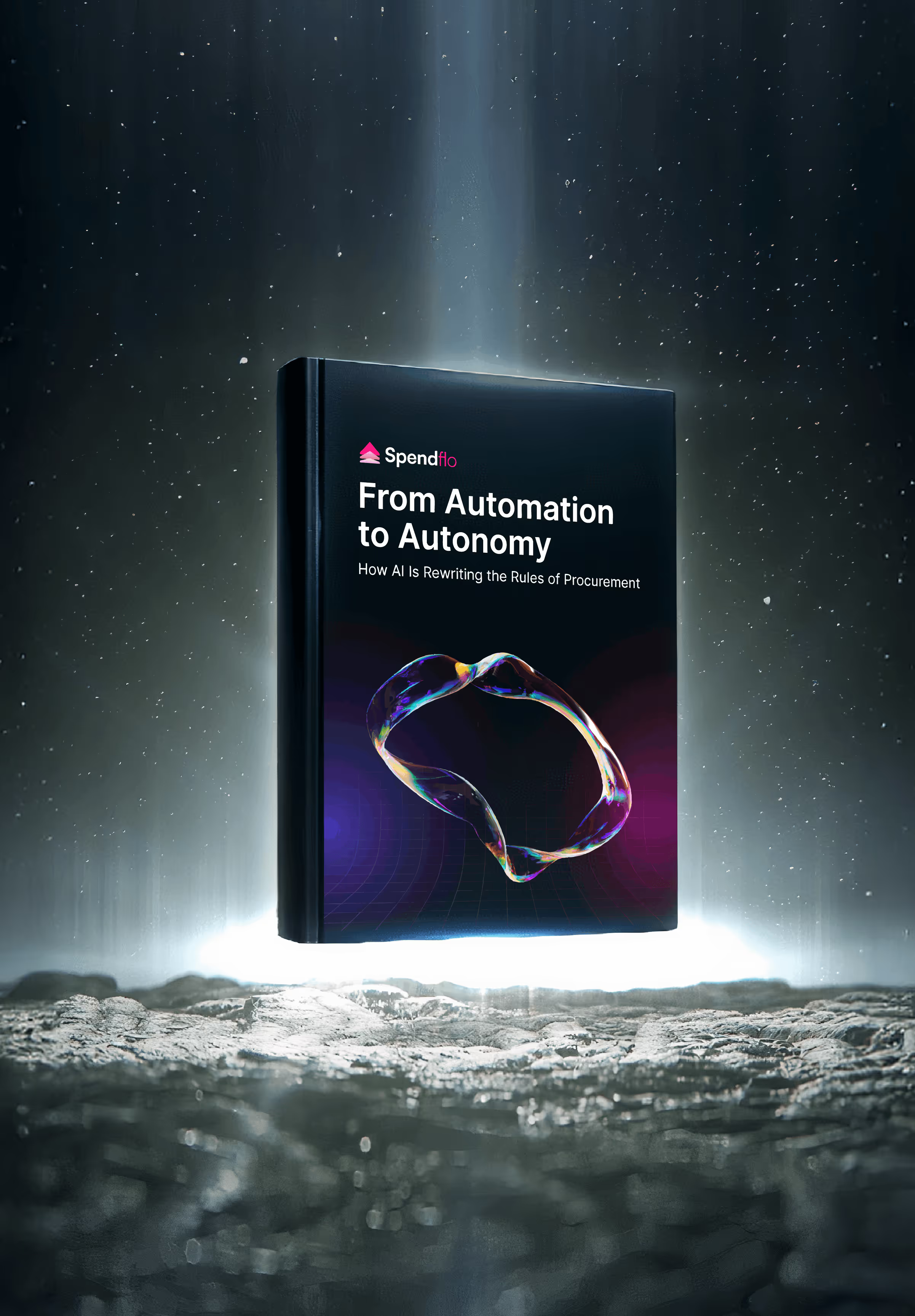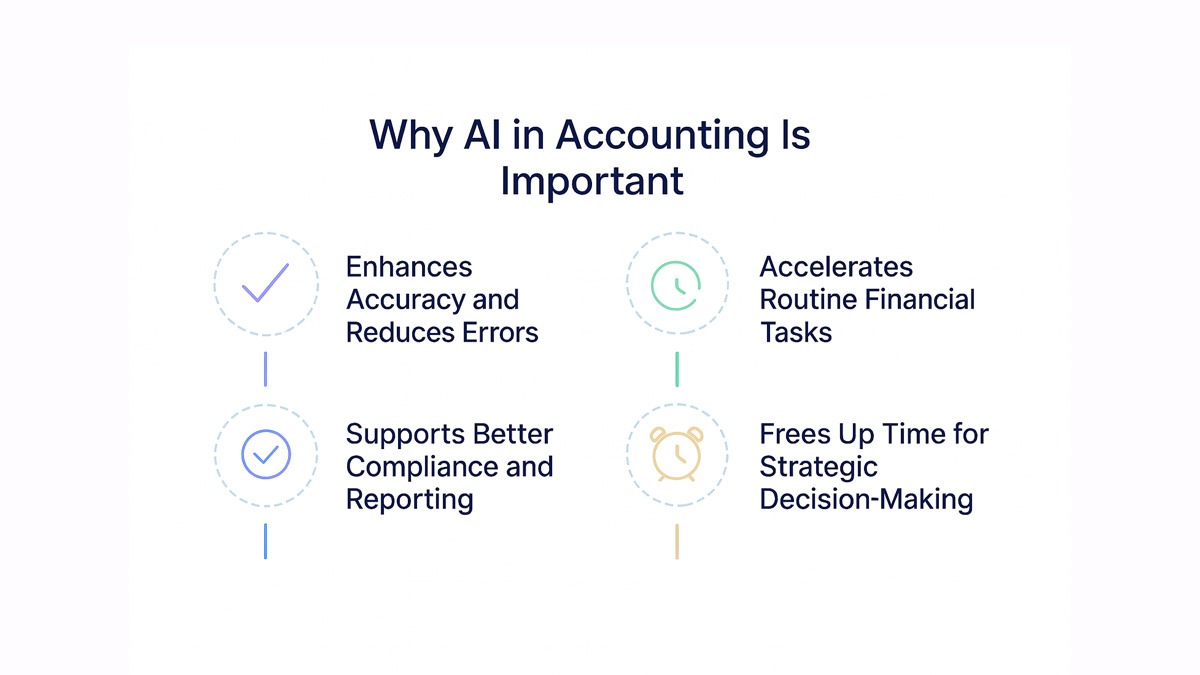

AI in Accounting: Trends, Use Cases & Tools for 2026 (And What Most Teams Still Get Wrong)

AI in Accounting: Trends, Use Cases & Tools for 2026 (And What Most Teams Still Get Wrong)
Explore how AI is transforming accounting in 2026 through automation, accuracy, and smarter financial decision-making.


The finance world is changing faster than spreadsheets can catch up. With AI shaking up everything from invoice approvals to cash flow forecasting, finance leaders are racing to rethink how accounting gets done. And it’s not just about speed or automation - it’s about smarter decisions, fewer errors, and leaner teams doing more with less. If you’re not exploring AI in your accounting function yet, you’re already behind.
What this blog covers:
- What is AI in accounting?
- Why AI in accounting is important
- Top AI use cases in accounting
- AI accounting tools to know in 2026
- How to implement AI in your accounting processes
- Challenges and considerations when adopting AI
- How Spendflo helps automate and optimize financial operations
- Frequently asked questions on AI in accounting
What is AI in Accounting?
AI in accounting refers to the use of artificial intelligence technologies to automate, enhance, and streamline financial tasks such as data entry, invoice processing, forecasting, and compliance. It helps reduce manual effort, improve accuracy, and unlock real-time financial insights.
Why AI in Accounting Is Important
AI isn’t just another shiny tool in the finance tech stack - it’s becoming the backbone of smarter, faster, and more resilient accounting operations. By offloading repetitive tasks and surfacing insights in real time, AI gives finance teams the power to do more with less.
Here are the reasons why AI is becoming critical in accounting today:

Enhances Accuracy and Reduces Errors
Manual data entry is notoriously error-prone. AI can validate transactions, detect anomalies, and reconcile discrepancies far faster than any human - and with greater precision. It also auto-fills transaction entries with high accuracy.
Accelerates Routine Financial Tasks
From sorting receipts to categorizing expenses, AI speeds up the mundane work. That means finance teams spend less time on admin and more time on high-impact analysis.
Supports Better Compliance and Reporting
AI-powered tools can automatically flag non-compliant entries, ensure audit readiness, and generate real-time reports aligned with regulatory standards.
Frees Up Time for Strategic Decision-Making
By automating the routine, AI allows accountants and CFOs to focus on forward-looking decisions, like scenario planning and budgeting. This shift leads to measurable productivity gains across finance teams.
Top AI Use Cases in Accounting
AI in accounting isn’t a vague concept anymore - it’s already being used to solve very real problems inside finance teams. From eliminating bottlenecks to improving decision-making, AI is showing up in specific, measurable ways across the accounting cycle.
Here’s how finance teams are using AI in practice:
Invoice Processing and AP Automation
AI reads and extracts data from invoices, matches them to POs, and routes them for approval - all without human intervention. This drastically cuts processing time and reduces late payment penalties.
Audit and Compliance Monitoring
AI tools scan through large volumes of transactions to detect anomalies or potential compliance breaches. Some platforms use neural networks to identify complex patterns in financial data. They can flag issues in real time, reducing the risk of regulatory violations or audit surprises.
Cash Flow Forecasting
Using historical data and trends, AI models can predict future cash inflows and outflows with high accuracy. This gives finance leaders better control over liquidity.
Expense Management and Categorization
AI simplifies expense tracking by automatically categorizing costs, flagging duplicates, and identifying patterns in employee spending - making reporting smoother and more reliable. This level of detail supports visibility into transaction-level records.
AI Accounting Tools to Know in 2026
With AI becoming more accessible and embedded into finance workflows, a new wave of tools is reshaping the accounting software landscape. These aren’t just glorified automation scripts - they bring machine learning, natural language processing, and predictive analytics into the heart of financial operations. As we head into 2026, here are some of the most talked-about AI tools that are earning the trust of modern finance teams:
Vic.ai
Vic.ai is built specifically for accounts payable automation. It uses AI to handle invoice processing end-to-end - including data entry, approval routing, and even decision-making. What makes Vic.ai stand out is its learning engine: over time, it gets smarter by analyzing accounting behavior and adjusting approvals accordingly. For mid-sized and enterprise finance teams handling thousands of invoices, it’s a serious productivity booster.
Docyt
Docyt focuses on real-time accounting for small and medium-sized businesses. It uses AI to sync bank transactions, extract financial data from documents, and automate reconciliations. Unlike traditional tools that rely heavily on manual adjustments, Docyt keeps your books updated daily. That’s a game-changer for businesses looking for near-instant visibility into financial performance. It also streamlines transaction reconciliation for faster reporting.
Booke.ai
Designed for bookkeepers and accountants, Booke.ai automates transaction categorization, detects inconsistencies, and generates client-ready reports in minutes. This significantly reduces monthly close time for accounting teams. What’s unique is its ability to “understand” accounting logic and client nuances - which means less back-and-forth and faster month-end closures. It integrates smoothly with platforms like QuickBooks and Xero, making it easy to adopt.
Tipalti
While not purely AI-focused, Tipalti incorporates machine learning in areas like supplier onboarding, fraud detection, and global payments. It’s ideal for companies managing complex vendor ecosystems. The platform also handles tax compliance and payment reconciliation, cutting down significantly on manual workload for AP teams.
These tools aren’t just "nice-to-haves" anymore. They’re rapidly becoming the core layer in
modern accounting tech stacks - and their AI capabilities are only getting sharper. For finance teams looking to scale without scaling headcount, tools like these offer a critical edge.
How to Implement AI in Your Accounting Processes
Adopting AI in accounting isn’t about flipping a switch - it’s about designing a thoughtful process that aligns with your goals, tech stack, and team readiness. Here’s how to make the transition smoother and more impactful:
Assess Readiness and Identify Gaps
Start by mapping out your current accounting workflows. Where are the bottlenecks? What’s still heavily manual? Identify areas with high volume and low complexity - these are ideal for AI automation.
Choose the Right AI Tools
Not all tools will fit your needs. Look for solutions that integrate well with your existing systems (ERP, procurement, payroll) and offer strong support and documentation. Cloud computing ensures these integrations are seamless and scalable. Prioritize usability and scalability over flashy features.
Train Teams and Set Expectations
Change can trigger resistance, especially if it feels like AI is “replacing” people. Focus on upskilling and show your team how AI frees them from mundane tasks so they can focus on strategic work.
Track Progress and Optimize Workflows
Use KPIs like time saved, error reduction, or faster approvals to measure AI’s impact. AI also helps surface emerging issues before they escalate. Iterate frequently - AI tools improve with feedback and data volume.
Challenges and Considerations When Adopting AI
AI brings big promises, but it’s not without friction. Implementing it in accounting requires more than just installing software - it demands cultural shifts, clean data, and clear expectations. Here are the key challenges finance teams should be prepared for:

Data Quality and Integration Issues
AI is only as smart as the data it learns from. If your financial data is fragmented across tools or riddled with inconsistencies, your AI outputs will suffer. Data hygiene and proper integration are non-negotiables.
Change Management and Resistance
Introducing AI can stir fear - especially if teams worry about job loss or control. It’s crucial to manage expectations, communicate the benefits clearly, and involve teams early in the process.
Security and Privacy Concerns
Finance data is sensitive. AI tools must comply with industry standards like SOC 2 or GDPR. Ensure any provider you choose prioritizes encryption, access controls, and audit trails.
Budget and ROI Expectations
Some AI tools come with steep learning curves or higher initial costs. It’s important to track ROI over time - not just in cost savings, but in hours reclaimed and risk reduced.
How Spendflo Helps Automate and Optimize Financial Operations
Spendflo simplifies the financial backend for fast-growing companies by centralizing SaaS procurement, spend tracking, and renewal management. With embedded workflow automation, it eliminates manual vendor tracking, surfaces hidden savings, and ensures procurement workflows stay audit-ready. This also reduces the burden of back-office processing for finance teams. For finance teams juggling multiple tools and contracts, Spendflo acts like a command center - offering real-time visibility, automated approvals, and expert-backed negotiation support. It’s not just about managing spend - it’s about gaining control and driving ROI across the finance stack.
Frequently Asked Questions on AI in Accounting
What are the benefits of using AI in accounting?
AI reduces manual effort, improves accuracy, accelerates processing times, and helps uncover insights from financial data. It also supports better compliance and streamlines workflows across the accounting function.
How can AI improve accounts payable processes?
AI automates invoice capture, matching, and approval routing, which minimizes errors and delays. It also helps detect duplicates, prevents overpayments, and ensures timely vendor payments.
Is AI in accounting suitable for small businesses?
Absolutely. Many AI tools are now designed with SMBs in mind, offering scalable features like automated categorization, real-time reconciliations, and intuitive dashboards at affordable price points.
What risks should finance teams consider when using AI?
Key risks include poor data quality, lack of integration with existing systems, security vulnerabilities, and resistance to change. It’s important to vet vendors carefully and invest in change management.
How does AI help small and medium-sized enterprises manage audit risk and data security issues?
AI tools can help small and medium-sized enterprises improve internal controls, reducing audit risk by flagging anomalies early. They also support secure data handling and encryption, helping mitigate data security issues that often come with manual accounting practices.
Can AI in accounting support financial analysis and tax strategy through transaction classification?
Yes, AI simplifies transaction classification, enabling accurate, real-time financial analysis. It also helps optimize tax strategy by identifying deductible items and aligning expenses with regulatory requirements, making tax filing more efficient.










.png)




.png)
















